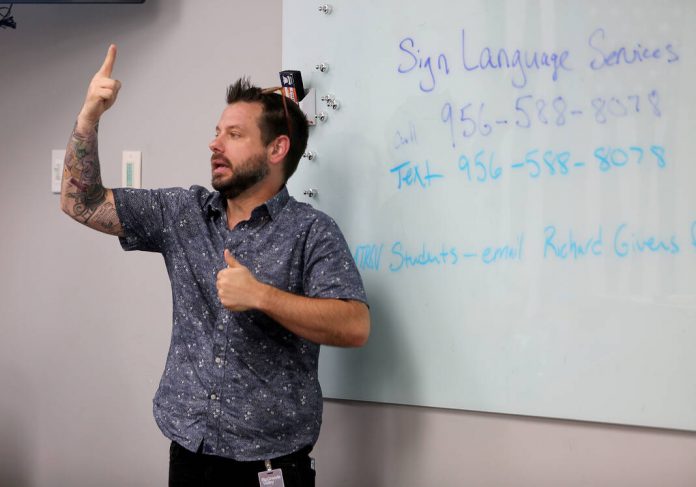
Brian A. Cheslik, assistant professor and program director for the American Sign Language and Interpreting program with College of Health Professions, signs during a class to teach ASL at the University of Texas Rio Grande Valley on Tuesday, June 28, 2022, in Edinburg. (Joel Martinez | [email protected])
EDINBURG — Efforts to equip law enforcement with the knowledge and tools to better communicate with the public were on full display in a classroom here at the University of Texas Rio Grande Valley on Tuesday, where officers got a crash course on American Sign Language.
To further progress the communication efforts between police officers and members of the deaf community, Brian A. Cheslik of UTRGV has for several weeks partnered with various police departments to provide free ASL classes. Cheslik is the assistant professor and program director for the American Sign Language and Interpreting program with the College of Health Professions at UTRGV.
“In March we had free classes for Deaf History Month and an officer from the Brownsville Police Department contacted me and wanted to set up classes for their officers and that kind of inspired me to develop this whole series for all first responders within the Valley,” Cheslik said.
The class focused on teaching officers deaf etiquette that will allow for a better understanding of the spectrum of deafness and how to more effectively communicate.
According to Gloria Guerrero, a part-time professor at UTRGV, throughout the course of the training officers will be taught basic level ASL including the alphabet, vocabulary related to police scenarios and various aspects of deaf culture.
The overall goal of the six-week course is to teach officers “basic conversational type signs” that will allow them to communicate with a deaf person until an interpreter arrives, explained Cheslik.
He added that “it’s also helpful (for officers) to learn how to get descriptive information — the colors or clothing types,” because it will allow them to begin an initial search description for a suspect until an interpreter arrives.
Although the training was initiated with the Brownsville Police Department, Cheslik hopes to expand the course to other emergency agencies across the Rio Grande Valley.
“We are training them to be able to communicate basic information with a deaf person whenever they need to alleviate that situation and make sure that it doesn’t escalate,” Cheslik said, adding that he is currently working on providing the training for the Pharr and McAllen police departments along with the Texas Department of Public Safety.
Sgt. Lee Ramirez of the Edinburg Police Department attended the training to further develop his ASL skills which were previously limited to the alphabet.
“The few people that I spoke to that were deaf and could communicate by spelling out the words, it did slow down things a lot,” Ramirez said. “A lot of times when you slow things down you do miss information, skip steps or they can’t really relay what they meant to say by spelling out the words.”
Ramirez said he learned the little sign language he does know from a friend when he was younger, but sees the value in committing to learning ASL rather than placing the responsibility to interpret on the hard of hearing.
“I would like to be able to make people feel comfortable with me and speak to me more personally,” Ramriez said. “I think I could do that with a deaf person if I can communicate in the language they are familiar with instead of trying to draw them into my language.
“I can reach out to them and make them feel comfortable in their environment.”




